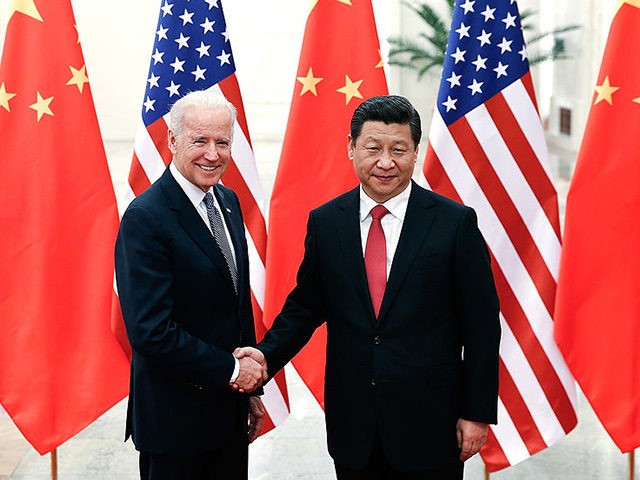China’s state-run Global Times on Thursday warned President Joe Biden that America is “doomed” unless he adopts policies friendlier to China’s interests than his immediate predecessor, Donald Trump.
The Global Times briefly lamented Biden’s failure to mention China at all in his inaugural address before launching into a detailed description of what he had better start saying if he wants to “remedy the deep damage left by Trump and re-engage with the world,” particularly “the world’s most consequential bilateral relationship” — the one between declining America and rising China.
First and foremost, the Chinese Communist paper instructed Biden to stop blaming China for unleashing the coronavirus pandemic, as Trump did.
Alas, “Chinese experts” worried that Biden would “inherit and continue the tough strategy” formulated by “conservative anti-China forces” and expressed frustration that a few of Biden’s cabinet choices seemed inclined to “continue some of Trump’s hardline policies.”
One of the Global Times’ experts, Lu Xiang of the Chinese Academy of Social Sciences in Beijing, sportingly proposed that Biden’s nominees were just talking tough to “please the different political forces” in Congress and might be more Beijing-friendly once they occupied their offices.
As with most Chinese state propaganda these days, the Global Times took a little coronavirus victory lap, quoting associate dean Jin Canrong of Renmin University’s advice for Biden to get smart and start emulating China’s superior system instead of fighting it:
Since 2018, the Trump administration has activated a “whole-of-government approach” to deal with China, and it has tried everything short of actual war to confront China, including a trade war, ideological struggles, sanctions against high-tech firms, propaganda and stigmatization, military pressure and support of separatists and secessionists to harm China’s sovereignty.
But the result of all these efforts have not had as much impact as desired, as the approach did not stop China’s development nor did it impact China’s export sector a great deal. As China turns out to be the only major economy to have posted positive economic growth in 2020, many US companies and consumers have paid a heavy price due to the unwise decisions made by the Trump administration, Jin said.
“So as long as Biden’s team is not stupid like Trump’s team, there will be some changes in tactics,” Jin noted.
Lu warned the United States is “doomed,” just like the late Soviet Union, if Biden turns out to be just “another Trump with better table manners.” He said avoiding doom will require the U.S. to abandon its futile quest to “contain China” and focus on its many domestic problems, including the remaining stages of the Wuhan coronavirus pandemic.
Lu recommended the U.S. immediately abandon its tariffs and bans on American sales of high-tech components to China, describing them as “self-injuring” policies. The Global Times editors pitched in with a demand for Biden to unilaterally abandon the prosecution of Huawei executive Meng Wanzhou for sanctions violations.
Jin suggested the best “icebreaker” for ending U.S. hostility toward China would be “climate change,” once Biden accepts Chinese superiority and develops the humility needed to ask Beijing for help saving the planet.
“We are not sure what Biden will do in his first 100 days, but we can say he must make some progress on these issues. If he wants to use Trump’s legacies as bargaining chips to pressure China on the negotiating table, the U.S. will pay a heavier price. We believe Biden is smarter than Trump,” Lu said in conclusion.
American political analysts generally expect Biden’s China policy to look a great deal different from Trump’s, although they greatly disagree about how. They generally expect Biden to push China for concessions on human rights while dismantling much of Trump’s resistance to Beijing’s strategic and economic agenda.
For example, Foreign Policy on Thursday advised Biden to hold off on easing Trump’s tough stance against China until there are visible improvements in the dire predicament of the Uyghurs and other persecuted minorities.
The New York Times worried Trump forced Biden into a corner by openly accusing Beijing of genocide against the Uyghurs even as Biden was taking office. Barron’s expected Biden to remain focused on a few of Trump’s specific criticisms, like China’s unfair trade practices and intellectual property theft, while generally getting the wheels of U.S.-China commerce turning again and removing some of the “volatility” from the relationship between Washington and Beijing.
The flashpoint most of these analyses agree upon is China’s use of the Uyghurs for slave labor, a moral horror that every commentator seems to agree Biden must address before he can make any concessions to Beijing. China will never admit it has done anything wrong, but perhaps it will pick up the signal that it needs to scale back on that particular human rights offense before the new American administration can make the concessions Beijing desires.

COMMENTS
Please let us know if you're having issues with commenting.